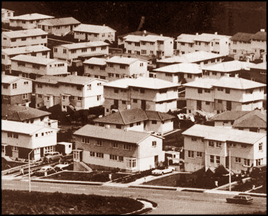Planning our urban future
by Seetha KODAGODA
Since 1985, the United Nations celebrates 'World Habitat Day" on the
first Monday in October of each year to focus attention on the state of
human settlements and the basic right to adequate shelter for all has
been celebrated on several themes by the UN-Habitat. This year the
"World Habitat Day" will be celebrated on the theme of "Planning our
urban future" the United Nations has chosen this theme to raise
awareness.
 The urbanization which is defined as the relative increase in urban
population, is a global phenomenon. In Sri Lanka as well as in other
developing countries, urbanization has led to a multitude of
socio-economic and health problems, attributed to social and economic
disparities and sub-standard or inadequate infrastructural facilities. The urbanization which is defined as the relative increase in urban
population, is a global phenomenon. In Sri Lanka as well as in other
developing countries, urbanization has led to a multitude of
socio-economic and health problems, attributed to social and economic
disparities and sub-standard or inadequate infrastructural facilities.
The basic housing and sanitation facilities provided nearly 35-40
years ago for them is inadequate. Facilities now have to be shared among
a population that has increased almost three-fold. This has resulted in
people living either in improvised shanty dwellings with little or no
infrastructure facilities and services or in overcrowded and
deteriorating tenements.
The urban population in particular is exposed to health hazards and
risk factors associated with both communicable diseases (Eg. diarrhoea,
tuberculosis, upper respiratory tract infection) and non-communicable
diseases (Eg. ischaemic heart diseases, accidents) due to lack of basic
sanitary facilities, poor housing, over-crowding, stagnation of waste
water, owing to clogged drains, uncollected garbage and environmental
pollution owing to rapid industrialization and urbanization are the
major contributory factors to the high prevalence of these diseases in
the urban areas. It has been observed that among the urban population
worst affected is the lowest income group, the slum and shanty dwellers.
Whole pattern changed
Their exposure to the casual factors for diarrhoea, acute upper
respiratory tract inspection and malnutrition is much greater than that
of comparable income groups in rural areas.
The epidemiological pattern of the country as a whole has changed
with the emergence of drug addiction. HIV/AIDS and dengue on the one
hand and the resurgence of once-controlled diseases such as cholera and
tuberculosis on the other. HIV/AIDS, the recent intruder has not however
assumed alarming proportions in Sri Lanka yet nevertheless it has become
a matter of great concern. Some adverse effects of city life, such as
drug addiction and promiscuous sexual conduct are conducive to the
spread of HIV/AIDS and other sexually transmitted diseases.
 Urbanization has caused a rapid increase in environmental pollution,
especially the streets in Colombo are almost always congested with
traffic. The carbon monoxide, lead and other toxic by-products of petrol
and diesel emissions of vehicles are serious health hazards not only to
those living within the city but also to those who come to the city from
rural areas for employment or on business. Carbon Monoxide is now
identified as one of the risk factors for cardiovascular diseases. Air
pollution by toxic gases and dust in urban areas is the main
contributory factor for the increase in acute bronchitis and asthma in
children and adults in the cities. Life in the metropolitan city, in
contrast to the rural setting, is hectic and hazardous and when coupled
with other adverse factors such as air and sound pollution aggravates
stress-related conditions like hypertension and cardiovascular diseases
and emotional disturbances such as anxiety and depression. Urbanization has caused a rapid increase in environmental pollution,
especially the streets in Colombo are almost always congested with
traffic. The carbon monoxide, lead and other toxic by-products of petrol
and diesel emissions of vehicles are serious health hazards not only to
those living within the city but also to those who come to the city from
rural areas for employment or on business. Carbon Monoxide is now
identified as one of the risk factors for cardiovascular diseases. Air
pollution by toxic gases and dust in urban areas is the main
contributory factor for the increase in acute bronchitis and asthma in
children and adults in the cities. Life in the metropolitan city, in
contrast to the rural setting, is hectic and hazardous and when coupled
with other adverse factors such as air and sound pollution aggravates
stress-related conditions like hypertension and cardiovascular diseases
and emotional disturbances such as anxiety and depression.
Traffic accidents, which contribute to high mortality in Sri Lanka,
are a major road hazard in our cities and are mainly due to bad and
congested roads, poor traffic management and reckless driving. Homicides
are also more prevalent in the city than in rural areas and are
attributed to drug peddling, hired killing and other nefarious
activities by the criminal underworld.
Commercial sex (or prostitution) is practised in almost all cities in
Sri Lanka. Although illegal, it is practised in our cities like in most
other countries, in filthy alleyways as well as in multi-star hotels at
various levels and under different guises and pretexts. It has several
adverse effects besides spreading venereal diseases.
Among them are alcohol and narcotic addiction, exploitation of women,
extortion and other criminal activities.
Healthy environment
A healthy environment is not only a need but also a right. According
to the universal declaration of human rights it is the right of every
person to live and work in an environment conducive to physical and
mental well being. The state as well as the community should take the
responsibility of achieving a healthy environment. Priority should be
given to reducing the burden of diseases by providing safe water,
habitable houses, latrines, regular collection of refuse and adequate
drainage of waste water. Proper traffic management with enforcement of
traffic laws will reduce to some extent environment pollution caused by
vehicles. In countries like ours with limited financial resources,
assistance the state can provide is minimum. The social community should
understand the needs for basic sanitation, housing and clean environment
for their well being so that they actively participate and contribute to
intervention programmes initiated by the State and NGOs.
 People should be given the responsibility of protecting their own
health by providing necessary knowledge and skills. Although the state
can enforce and implement laws against nefarious activities in the
cities, it is only by community initiatives and participation that drug
peddling, prostitution and other criminal activities can be reduced.
There should be community programmes to promote income generating to
remove people involved in unlawful activities. People should be given the responsibility of protecting their own
health by providing necessary knowledge and skills. Although the state
can enforce and implement laws against nefarious activities in the
cities, it is only by community initiatives and participation that drug
peddling, prostitution and other criminal activities can be reduced.
There should be community programmes to promote income generating to
remove people involved in unlawful activities.
Uplift low income groups
The city low income groups should be provided with knowledge and
skills to improve their resource capacity and make them a self-reliant
community with their own organizational activities Emphasis should be
placed on facilitating social integration, community participation, NGO
management, manpower development and cohesion among people living in low
income areas to provide self-reliance. There should be community
commitment and participation in providing services to the community so
that they perceive the services provided for them. It is the
responsibility of the community leaders to initiate appropriate
programmes for the needs of their own community and the state should
provide only assistance in the form of scientific knowledge and finances
to keep them viable.
The writer is a Senior Manager (NHDA),
Town Planner (ITPSL), and Real Estate Consultant (IREV)
|

